Last year, three community groups in Arua District's Ajia Sub County were identified as beneficiaries of ecological fish farming project, sustainable environmental management sub-component of Development Response to Displacement Impacts Project (DRDIP) which was designed to improve access to basic social services, expand economic opportunities and enhance environmental management for refugee-hosting communities and settlements.
It was implemented under Office of the Prime Minister (OPM) with funding of USD 150 million grant and USD 50 million International Development Association loan, approved by World Bank on 17th June 2017 and the project ended on 30th June 2024 after six months extension from original deadline of December 2023.
In Arua District, these fish farming groups; Onyova, Ama-Otozu and Oyeku, generated budgets to establish fish ponds, organised members for training to start the project and opened bank accounts as requirements to receive money for the project awarded to Gulu University Hoima Campus as Implementing Partner.
This project, if implemented successfully, would help to improve livelihood of the community members, but the success now hangs in balance as the Implementing Partner has not done enough even after the end of original DRDIP implementation period ended last years, before extension was made to July 2024.
“They (Gulu University Hoima Campus) were supposed to supply for us feeds of about 2,600kg but what we received for now is 10kg and it is even over so the fish will not have their feeds” the Secretary of Onyova Fish Farming Group, Ababo Alfred revealed this in interview with AIIJ on 13th August 2024, generating many questions of accountability and fate of this project.
Several documents for this project were received from different sources to ease investigation; these include copies of budgets drawn by and submitted by the groups, inputs delivery notes, funds transfer forms and complaint letter by the district.
A total budget of 28,600,000/= was drawn by Onyova Fish Farming Group for inputs to establish a fully operational fish pond in Ombamba Village, Ajia Sub County, Arua District.
On 14th September 2023, a total of 22,366,000/= was transferred from the account of Onyova Fish Farming Group in Post Bank Arua branch to the account of Gulu University Hoima Campus Fish Development Project at Stanbic Bank Hoima branch as the Implementing Partner’s cost of inputs.
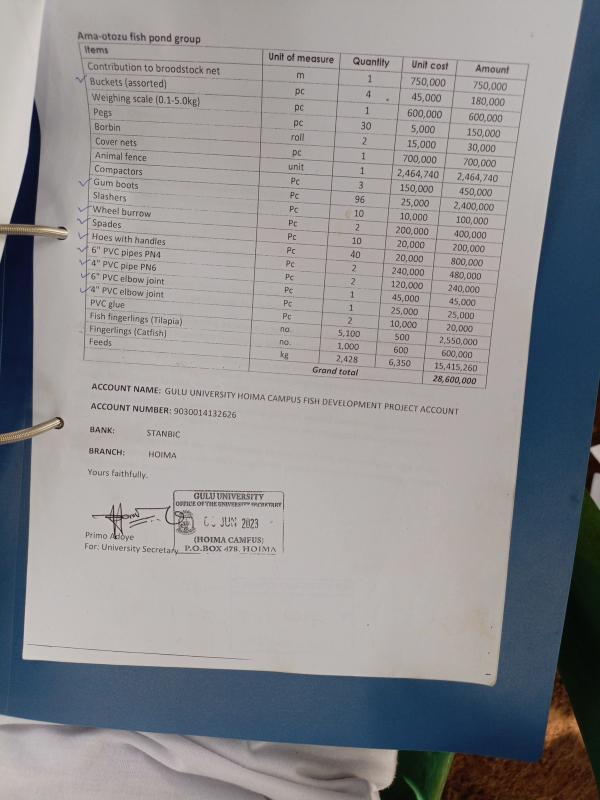 According to the Bill of Quantity/budget, the university was expected to deliver tools for excavating fishpond, fingerlings and feeds among others. But 12-days later, only items (inputs) worth 3,239,000/= were delivered as indicated on a delivery note dated 26th September 2023. These were delivered by Milard Okuonzi and verified by Onzima Owen, all attached to Gulu University Hoima Campus as indicated on the delivery note.
According to the Bill of Quantity/budget, the university was expected to deliver tools for excavating fishpond, fingerlings and feeds among others. But 12-days later, only items (inputs) worth 3,239,000/= were delivered as indicated on a delivery note dated 26th September 2023. These were delivered by Milard Okuonzi and verified by Onzima Owen, all attached to Gulu University Hoima Campus as indicated on the delivery note.
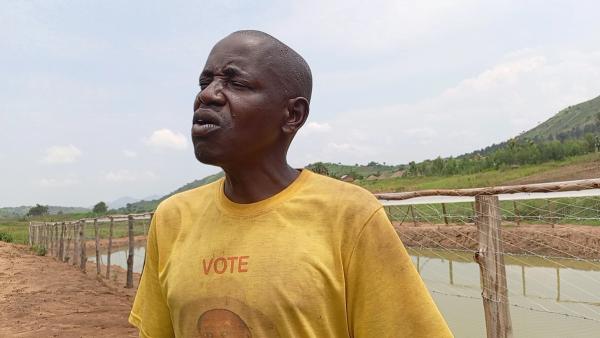 The Secretary of Onyova Fish Farming Group, Ababo Alfred, said, other items worth 6,228,240/= were later delivered by the Implementing Partner without any proof of record. Some of these were delivered late while most of them were below the quantity and quality approved in budget.
The Secretary of Onyova Fish Farming Group, Ababo Alfred, said, other items worth 6,228,240/= were later delivered by the Implementing Partner without any proof of record. Some of these were delivered late while most of them were below the quantity and quality approved in budget.
“Compactors were brought here when project (fish pond establishing) has been finished and those were even hand-made compactors, they could not help us that is why you can see erosional signs here showing that the land was not compacted so now soil is removing into the water” he said.
Out of 22,366,000/= transferred by the group for inputs, a total of only 9,467,240/= was spent by the Implementing Partner to get the inputs, including items delivered without proof of record which is still not accounted for by the implementing partner. This leaves a balance of 12,898,760/= for items not delivered, it still remains unknown if these will be delivered.
By time of visiting the group, they were still expecting fingerlings of catfish worth 600,000/=, brood-stock net budgeted at 750,000/=, weighing scale at a cost of 600,000 and feeds worth 15,354,300/=
The same institution, Gulu University Hoima Campus, was entrusted by Office of the Prime Minister as Implementing Partner for similar projects in Ama-Otozu and Oyeku Fish Farming Groups, these are all experiencing challenges of inadequate input deliveries, poor quality and improper records.
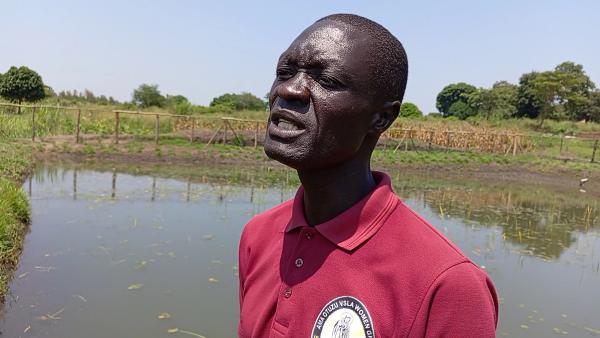 “The inputs that we received, if I try to add the total, it only costs 3,239,000/= out of 23,000,000/= so, rest of the balance, I cannot even ask now. And then they (Gulu University Hoima Campus) advised us that they are bringing (other inputs) but from that time up to now they have not brought” the Chairperson of Ama-Otozu Fish Farming Group, Alex Anguyo, said this in an interview recently.
“The inputs that we received, if I try to add the total, it only costs 3,239,000/= out of 23,000,000/= so, rest of the balance, I cannot even ask now. And then they (Gulu University Hoima Campus) advised us that they are bringing (other inputs) but from that time up to now they have not brought” the Chairperson of Ama-Otozu Fish Farming Group, Alex Anguyo, said this in an interview recently.
The group had a total budget of 28,600,000/= to buy inputs for operationalization of fish pond in Ombokoro Village, Ombokoro Parish, Arua District and money was released as members hoped to receive all these inputs timely. On 22nd August 2023, the then DRDIP Desk Officer in Arua District, Joackim Andiandu, authorized the transfer of 22,360,000/= to cater for input costs and Implementing Partner’s cost before he passed-on early this year.
Out of 28,600,000/= approved for inputs, the group only received items worth 3,239,000/= as indicated on delivery note dated, while the Implementing Partner later delivered other worth 4,464,740/= without any proof of record. This brings to only 7,703,740/= the amount of all items delivered by Gulu University Hoima Campus based on calculation for items indicated on the delivery note and those that are not indicated but delivered.
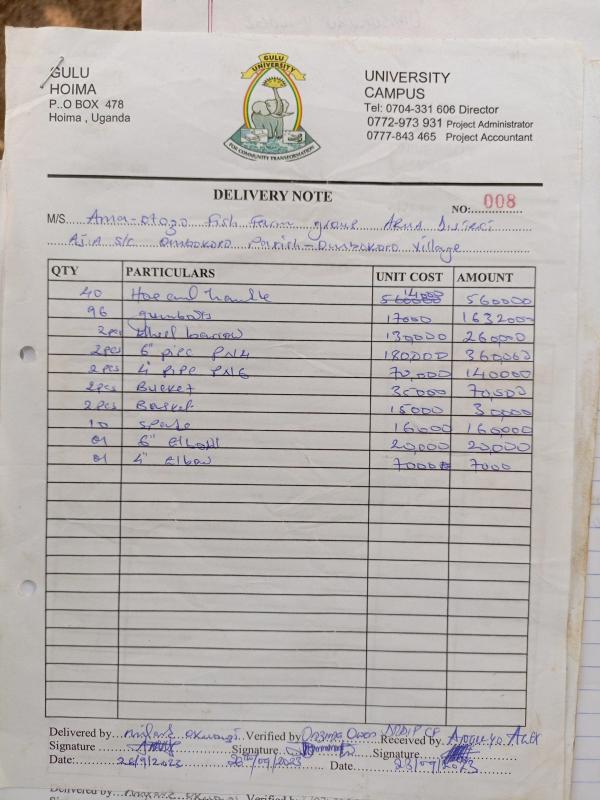
This raises question on the balance of 20,896,260/= for items not delivered which has gone unaccounted by the implementing partner, Gulu University Hoima Campus.
Before the start of this project, all members in each of the three beneficiary fish farming groups; Onyova, Ama-Otozu and Oyeku, were supposed to be trained in fish farming with focus on fish management right from opening pond to harvest period. But none of the groups confirmed that they received these trainings of which allocation was made, forcing the groups to rely on few members of community with little fish management skills.
According to the project implementation guideline, technical persons like Fisheries Officer and Environment Officer from districts implementing the project would help these groups to ensure smooth implementation, working along with the implementing partner, by giving technical advice. But these officials from Arua District did not play their key roles as provided-for in the implementation guideline.
Members of the beneficiary groups attribute this to some of the major challenges like poor quality of work and irregularities in input deliveries as they lack guidance and supervision was not done by the district officials.
Arua District Environment Officer, Hannington Adroonzi, stated that the implementing partner was independently implementing this project and working directly with beneficiaries without notifying the district.
“As I talk now, I never participated in any of the activities other than site suitability survey. To us we concluded that it was a failure and non-implementation because it you don’t pass via this office which is the coordinating office. Ideally if you are to go the field this office has to know that you are moving out to field and if you needed assistance of the technical person then you are accompanied but since they were operating illegally without involvement of this office, for us we have no knowledge on that” he said.
As result of delayed completion and irregularities in DRDIP project, Arua District Chief Administrative Officer, Nicholas Ogwang, notified Gulu University in a letter dated 17th June 2024 addressed to Head of Industrial Development at Gulu University Hoima Campus. This letter was a warning to the university over delayed completion of fishponds construction, stocking the ponds with quality fingerings and failure to comply with terms in the Memorandum of Understanding that the university signed with OPM.
In an interview the CAO one-month later, he said the letter received no reply and acknowledged poor working relation with the institution while implementing this project but hopes for improvement as intends to involve all the key stakeholders.
“Where things have reached, there are a number of interventions going-on right from Office of the Prime Minster, Inspectorate of Government, Police and our own technical team, they are making a number of follow-ups. I have directed the fisheries department and DRDIP Desk Officer to furnish my office with a detailed status report which should be able to inform all stakeholders what the situation is on the ground so that we should be able to ascertain and definitely, decisions will be made; whether they should refund the money or otherwise.” CAO informed
On 15th August 2024, Police in Arua District arrested three people who introduced as Gulu University Hoima Campus staffs upon visiting to Arua District CAO to deliver a report on progress of DRDIP projects implementation in the district. Due to unclear identification, they were arrested but later released after police clarified from the university they were delegated.
While in Obongi District, police also arrested three senior officials of the university over allegation of ghost projects in the district. The officials included Project Administrator, Dr. Primo Adoye, Site Engineer, Jude Rutabingwa and Aquaculture Specialist and Technical Advisors, Ivan Abaho.
The Project Administrator, Dr. Primo Adoye, is the Senior Assistant Academic Registrar at Gulu University Hoima Campus that signed a Memorandum of Understanding with Office of the Prime Minister to implement DRDIP sub-project of establishing fish ponds in 11 districts. It is a campus of Gulu University, one of the public universities in Uganda.
The university in knowledge of top leadership previously signed a contract as implementing partner for under NUSAF 3 for a sub-project of establishing fishponds which was successfully done.
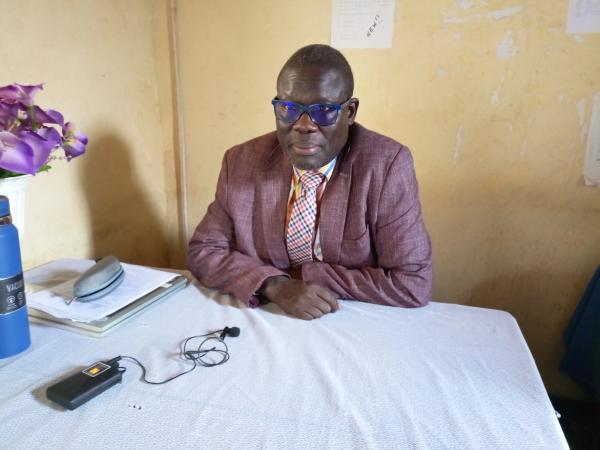 But Gulu University Vice Chancellor, Prof. George Openjuru, said that the university management is not aware about the current DRDIP project that Hoima campus is implementing in 11 districts and only got to know about it when the campus started to face challenge of implementation.
But Gulu University Vice Chancellor, Prof. George Openjuru, said that the university management is not aware about the current DRDIP project that Hoima campus is implementing in 11 districts and only got to know about it when the campus started to face challenge of implementation.
“As far as we are concerned, we did not enter any formal contract to implement any project with Office of the Prime Minister as university because all contracts are signed by the University Vice Chancellor or the University Secretary, I now understand that this matter is in court and under investigation by IGG and I would not like to make a lot of statement about it. As far as our staffs are concerned, we are going to continually discuss with them and see how we can take the matter forward” the VC confirmed.
However, Environment Officer incharge of Environmental Projects at Office of the Prime Minister, Moses Sekajja, acknowledges the challenges faced by Gulu University Hoima Campus, and pledge that the benefiting districts and communities will be involved to discuss on finding solutions to ensure the projects achieve set targets.
“In case we find that they don’t complete the projects, then they have to refund the government money and then we go back, sit with the community to find out what can be done to then we tell the district to help them to do what can be done” he said.
The Inspectorate of Government has also picked interest in monitoring this project and making observations to understand challenges in implementation. Their focus, according to Deputy Inspector General of Government, Dr. Patricia Achan Okiria, is in the areas of accountability and value for money.
She also informed that the implementing partner had not assessed some projects sites and some land offered for projects were taken back due to delayed start of the project.
“So when we came in as Inspectorate of Government, we were looking at the completed projects and give thumps up-this is a good job, partially completed we are asking for deadline and asking them to complete. Those that have not been commenced at all, we are looking for value-for-money. So if you have been paid as an implementing partner and there is nothing on ground, then you are put to task to explain” she said.
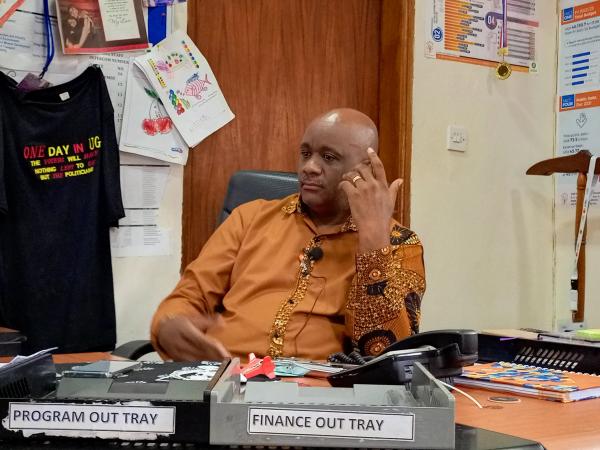 On the question of procurement to get companies for project implementation, the Executive Director Civil Society Budget Advocacy Group (CSBAG), Julius Mukungu, proposes decentralization of procurement at local government and digitalized the process for transparency.
On the question of procurement to get companies for project implementation, the Executive Director Civil Society Budget Advocacy Group (CSBAG), Julius Mukungu, proposes decentralization of procurement at local government and digitalized the process for transparency.
“We must mean decentralization the way it is and execute it the way it is supposed to be, that power belong to people, give the power to decide how money is supposed to be spent. Therefore, let them procure themselves, if it is a complicated project, support them to do it because they are also Ugandans” the ED advised.
By the time of compiling this report, all the three fish farming groups in Arua District were still waiting for inputs that were not delivered by the implementing partner, Gulu University Hoima Campus. Accountability for items delivered without proof of record was still lacking with no explanation, no more inputs were delivered and community members in the groups still struggling to manage the fish ponds without feeds and technical guidance.
This investigation was produced with support from the African Institute for Investigative Journalism
A story by Sabir Musa





